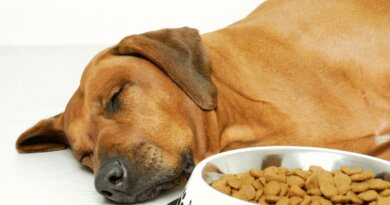How Do I Firm Up My Dog’s Stool?
Soft stool in a dog is not an unusual problem.
In most cases, this will come and go occasionally. But if your dog’s stool doesn’t firm up on its own after a few days, the dog may need some help to form a solid stool again.
Why Dogs Have Soft Stools?
Unless your dog has a health problem, their diet is the most common thing that affects the consistency of the dog’s stool.
In general, dogs need a diet that contains sufficient amount of digestible protein and fiber to have regular, normal bowel movements.
The best diet for dogs with soft stool is a high protein (meat-based) diet with addition of vegetables (often included in most dog food brands) which provide fiber.
While most contain some higher, certain pet food brands are higher in fiber than others.
Difference Between Soft Stools and Diarrhea in Dogs
It can be hard to tell the difference between soft stools and diarrhea because it’s very subtle.
Soft stools are formed bulky and can be picked up.
Diarrhea is more liquid and it almost seems like water, without any form, and it’s impossible to pick it up.
Diarrhea may indicate a health problem or that your pet ate something harmful or toxic.
If it lasts for more than a couple of days, the dog needs to see a veterinarian.
Unlike diarrhea, soft stools are rarely a health concern.
Instead, they are indicative of a poor quality diet, feeding foods to which your dog is intolerant, or a lack of fiber in the diet.
If soft stools last for more than a few days, it could mean that a dietary change is necessary; however, it could also be a symptom of a recent dietary change that you’ve already made, especially when a dog’s food is changed suddenly.
How Do I Firm Up My Dog’s Stool Through Diet?
The first step to firming up your dog’s stools is to make dietary changes.
1. High-Quality, Well-Balanced, Protein- and Fiber-rich Diet
A high-quality diet doesn’t always mean expensive, even if many top rated dog foods do cost more. It’s about making a correct choice for your individual dog.
For example, if your dog has soft stool, skip pate-type diets since they can be very rich in minerals like salt, lower in protein and lack fiber.
Choose dog foods that list meat as the first ingredient and ensure it’s not meat derivatives, meat by-products, etc.
Lowering fat content will also help to firm up a dog’s stool.
Choose white meats like chicken, turkey, rabbit or even white fish – they contain less fat than red meats.
Also, pick dog foods with a smaller number of ingredients as they’re likely to contain fewer irritants, preservatives or processed foods.
Other ingredients in quality dog foods that will help to firm up a dog’s stool include rice, oats, barley and wheat.
Avoid foods with soy or ingredients made from soybeans.
Some dog food brands are specifically designed to firm up your dog’s stool through a set of ingredients. Try some of these brands:
2. Avoid Fatty Foods
Decrease fat content from commercial foods or any other sources.
Don’t feed your dog high-fat foods (snacks or home diet), especially fats that become rancid easily.
If you’re cooking for a dog, note that foods fried in oil, particularly palm oil, are hard to digest and they can form a layer in your dog’s intestine that leads to watery or soft stools.
3. Try a Lactose-Free Diet
Other than young puppies that drink bitch’s milk, most dogs don’t digest cow’s milk well, because their body cannot break it down properly.
Undigested milk sugars draw water from a dog’s intestines and lead to soft stools. So avoid giving your dogs milk or dairy products if you notice them having soft stools.
Even some puppies on a milk replacement diet have trouble breaking down lactose into sugar that can be digested and absorbed if they have a lack of an enzyme called lactase.
Choose a lactose-free replacement if you see that your puppy is passing soft stools.
4. Switch to Dry Food
If you mostly give wet foods to your dog, switch to dry kibble because they contain less water.
Higher moisture content can sometimes lead to wetter and bulkier stools.
Dry food can reduce the volume of a dog’s stool and make it firmer.
Make the switch to the new type of diet gradually, slowly adding new foods into your dog’s existing diet over the course of 5-6 days.
Your dog’s intestinal flora and fauna will have a chance to adapt so you won’t upset their stomach.
5. Add Extra Fiber to a Dog’s Diet
Fiber soaks up fluid and can help with firming up soft stools in dogs, or even diarrhea. It is also a bulking agent, so your dog can feel full for longer and allow you to decrease the dog’s calorie intake when they’re overweight.
However, you need to be careful with adding extra fiber to a dog’s diet since too much fiber can upset their stomach.
For commercial foods, choose brands that have a crude fiber content of around 10%.
You can also add the fiber through natural foods, such as including oats, pumpkin or wheat bran in your pet’s meals.
One teaspoon per 20 pounds of your dog’s body weight is a good start.
You can increase this a little bit once your dog gets used to it. You can also give them raw fruit or vegetables to increase fiber intake.
Some homemade meals are higher in fiber than others; try this recipe or this one.
Finally, fiber can also be added through pet supplements – either given directly, or sprinkled over your dog’s commercial kibble or homemade meal.
Some of the best fiber supplements for dogs which are easy for pet owners to use in a diet are:
6. Give a Dog Probiotics
Dogs have good gut bacteria that aids digestion.
If your dog was on a poor diet for a while, there may be an overgrowth of “bad” bacteria, which can impact the natural balance of bacteria in a dog’s gut.
In this case, supplementing with “good” bacteria can regulate the imbalance and improve your dog’s digestion and bowel movement.
Dogs don’t have the same gut fauna as humans, so giving them human probiotics will not help and can even be harmful, and cause diarrhea.
Only use probiotiocs made for dogs specifically, such as Purina’s Fortiflora ($27.95) or Zesty Paws ($25.97).
These probiotics usually come in capsules.
One capsule per day for a week or two should be enough to restore the balance in your dog’s gut.
If that doesn’t help, or you’re not sure about the dosage, consult your veterinarian to ensure the optimal results.
7. Provide Fresh Water for Your Dog
Make sure that your pooch has fresh water available at all times.
Dogs that have soft stools lose more water and are at risk of dehydration, so they need to have easy access to fresh drinking water to replace lost fluids.
Also, keep your dog’s water bowl clean to avoid bacteria build-up. Stainless steel bowls are less bacteria-ridden than plastic ones.
Keep Your Dog Stress-Free
Like humans, some dogs experience digestive problems when they are stressed out.
If your dog has soft stools often and you’re positive it’s not a dietary issue, it may be caused by a psychological mental state.
There’s a large number of things that can cause stress in dogs, such as moving into a new house and a dog being in a new environment, radical changes in their schedule and routine, bringing home a net pet or a baby, constant visits from guests and more.
If these can be removed at least temporarily, you’ll know whether or not it’s stress that’s causing soft stools in your pet.
Furthermore, avoid doing stressful activities with the dog for a while.
For example, if your pooch finds baths stressful, delay them for a few days to see if a dog’s stool firms up.
If stress is causing your dog’s soft stools, a bland homemade diet like chicken and white rice can be helpful while you’re figuring things out.
In Summary
Soft stools in dogs are quite common and usually not a serious health concern.
To firm up a dog’s stool, feed them a high-quality diet that contains enough meat and fiber, and avoid fatty foods or a high-fat diet.
You can also increase a dog’s fiber intake through homemade meals, addition of veggies or fruit, or giving them a fiber supplement.
Probiotics for dogs are another helpful dietary addition that can firm up their stool. Ensure a dog always has access to fresh water.
Finally, it could also be stress that’s causing this issue.
Try to remove all stressors from a dog’s life, at least for a short period.
If none of these solutions help and your dog continues to pass soft stools, take him to the vet to rule out any health issues.
READ NEXT: The Best Dog Food for Dogs With Diarrhea and Loose Stools
Want to share this?
Related







